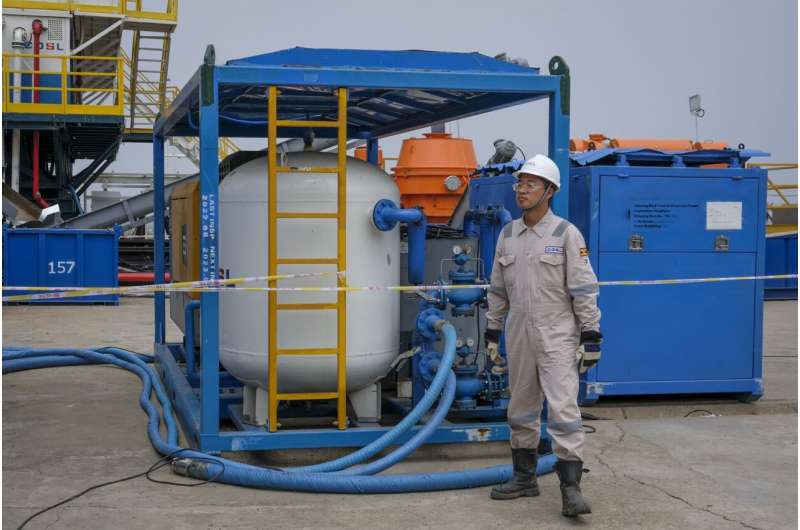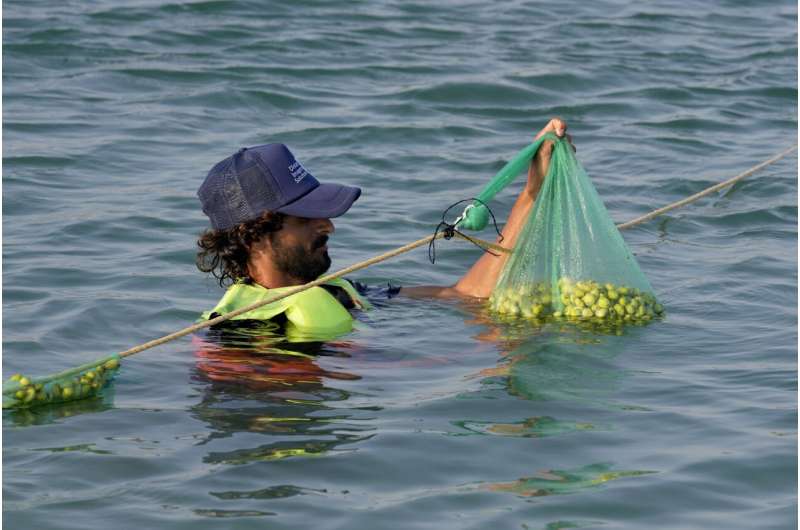This article has been reviewed according to Science X's editorial process and policies. Editors have highlighted the following attributes while ensuring the content's credibility:
fact-checked
reputable news agency
proofread
Oil companies attending climate talks have minimal green energy transition plans, AP analysis finds

In 2022, Brazilian oil and gas company Petrobras had 68 places staked out for oil exploration off the South American coast, searching for new reserves while spending $6.9 billion in oil development projects. About the same time, Algeria-based Sonatrach proclaimed its ambition to ramp up production to become a top five national oil company by 2030. And Abu Dhabi National Oil Co. opened 68 new gas stations in Saudi Arabia and the United Arab Emirates, noting in its 2022 annual report that there were now more than 500 across the UAE.
All these companies, along with 33 others focused on oil and gas, sent delegations to Egypt for last year's annual climate summit, known as COP27, aimed at moving the world away from the burning of fossil fuels like oil and gas. Many will likely be at the upcoming conference, COP28, being hosted in the UAE, which appointed Sultan al-Jaber, chairman of the nation's oil company, as president of the summit.
Faced with criticism about their presence at negotiations, leaders of such companies argue they are part of the transition to renewable energies, an argument that negotiators like U.S. Climate Envoy John Kerry have cautiously endorsed. But an Associated Press review of how much these companies invest in green energies, along with the priorities laid out in their annual reports, cast doubts on genuine commitments to transition.
Most companies only have small, if any, investment in solar or wind power, the most established green technologies. Most of their investments, billions of dollars, are in further exploration, extraction and refining of oil—with plans laid out in some cases over the next decades. That's long beyond when scientists say the world must move away from fossil fuels.

"These are companies with enormous profits at present, enormous engineering capabilities and have been producing oil and gas for a very long time," said Jason Bordoff, director of the Center on Global Energy Policy at Columbia University. "It is reasonable to expect leadership in how quickly they lead and move and develop new technologies and drive the cost down" of renewables.
The companies at last year's summit don't look to be making such efforts in any big way. Many that publish annual reports have sections entitled "sustainable" or "green" that do include some renewables. However, in such sections they also include biofuels, hydrogen development and carbon capture, all things that at best have long-term potential to reduce emissions. Many also tout natural gas which, while cleaner-burning than fuels like coal, still emits significant amounts of methane, a potent greenhouse gas.
Almost all the companies focus on reducing emissions in their operations, and don't address the emissions that will result when customers use their products to power cars, heat homes, move ships and planes, and so forth.

Those emissions are known as "Scope 3" and they are commonly seen as both the biggest share of a company's emissions and the most difficult to solve, with many companies arguing they are out of their control. (Scope 1 refers to a company's direct emissions, and Scope 2 are indirect emissions that come from production of the energy a company acquires to use in its operations.)
Amir Sokolowski, global director of the Climate Change Team at CDP, a nonprofit that asks companies to disclose their climate impact, said fossil fuel companies are reluctant to take on emissions from their products after they're out the door.
But that reluctance isn't rational "because the point is that oil and gas cause most of the combustion in the world in terms of emissions," Sokolowski said.
Petrobras, majority-owned by the Brazilian government, specializes in deep water exploration, drilling and extraction. Its 2023-27 strategic plan earmarks $4.4 billion in investments "to strengthen our low carbon position." Petrobras' planned investments in crude oil exploration and production for the period are more than 10 times higher than its low-carbon investments, according to the World Benchmarking Alliance, which tracks companies on sustainability goals.

Meanwhile, the company's commitment toward those core products is clear. The scores of exploratory leases and billions invested in searching for new oil deposits fit a strategy that expects oil and gas production "will still be necessary to guarantee the energy security of Brazil and the world in the coming decades," the company says on its website.
Sixteen of the oil companies that went to last year's climate summit have publicly responded in recent years to questionnaires prepared by CDP, which invites companies and countries to be transparent about what they're doing on carbon and the climate. One question was how much of their spending was aimed at helping with the global goal to limit warming to 1.5 degrees Celsius since pre-industrial times, which scientists warn is necessary to stave off the worst impacts of climate change, like increasing extreme weather events.
Equinor, a Norway-based oil and gas company, answered in 2022 that 11% of its capital spending could be classified this way, with a goal of 30% by 2025. Notably, Equinor was also one of a minority of companies with a plan to tackle Scope 3 emissions—those caused by consumers' use of its products—to get to net zero emissions by 2050.

Equinor's plan includes a big focus on renewables. The company is building out the world's largest offshore wind farm, aimed at powering 6 million British homes one day. But the plan also depends on carbon capture and carbon offsets, or the equalizing of emissions by paying to capture them somewhere else. Equinor also says it will be necessary to continue to produce oil and gas "for the foreseeable future," in part to avoid global shocks.
Al-Jaber's company, ADNOC, earlier this year began using drones to scatter mangrove seeds across Abu Dhabi, part of what it touted as a sustainability effort to plant some 2.5 million of the carbon-storing plants. Yet the company's investment in low-carbon projects amounts to just 10% of its reported plans for $150 billion in capital spending through 2027.
ADNOC, Petrobras, Equinor and Sonatrach declined or did not respond to interview requests to talk about their energy transition plans.

Some companies in developing nations underscored the tension between the importance of oil and gas to their national economies and the industry's contribution to climate change, which can hit their countries harder than the developed world.
Uganda National Oil Co. in August announced formation of the Alliance for Climate Resilience to Combat Climate Change, an effort it said would include things like planting millions of trees, decarbonizing industry and shifting to cleaner cooking methods, with hopes to attract other East African nations to join.
But Uganda National was among companies whose plans for renewable energy were aimed primarily at using the clean power to decarbonize its fossil fuel projects, not replace them with cleaner pursuits.
Proscovia Nabbanja, the company's chief executive, referenced the difficult transition in an essay titled "Advancing Equitable Clean Energy in Developing Nations." Nabbanja noted pressure on nations like hers "that have not benefited from significant industrial and economic growth but are now expected to reduce emissions at the expense of their own development." She said wealthier nations have to lend money and technology to help developing nations with an "equitable energy transition."
-

Mangroves are reflected in the water at Al Nouf area southwest of Abu Dhabi, United Arab Emirates, Wednesday, Oct. 11, 2023. Abu Dhabi National Oil Co. (ADNOC), earlier this year began using drones to scatter mangrove seeds across Abu Dhabi, part of what it touted as a sustainability effort to plant some 2.5 million of the carbon-storing plants. Credit: AP Photo/Kamran Jebreili -

Cars pass by an Abu Dhabi National Oil Co. (ADNOC) gas station with the Burj Khalifa, the world’s tallest building, in background, in Dubai, United Arab Emirates, Saturday, Nov. 4, 2023. Credit: AP Photo/Kamran Jebreili -

A drone pours mangrove seeds over a lagoon at Al Nouf area southwest of Abu Dhabi, United Arab Emirates, Wednesday, Oct. 11, 2023. Abu Dhabi National Oil Co. (ADNOC), earlier this year began using drones to scatter mangrove seeds across Abu Dhabi, part of what it touted as a sustainability effort to plant some 2.5 million of the carbon-storing plants. Credit: AP Photo/Kamran Jebreili -

Capuava oil refinery owned by Petrobras sits in Maui, on the outskirts of Sao Paulo, Brazil, Monday, Nov. 6, 2023. Petrobras specializes in deep water exploration, drilling and extraction. Credit: AP Photo/Andre Penner
Peter Muliisa, the company's general counsel, said that as a developing country, Uganda has low emissions relative to other nations. He also argued that it should be up to countries, not companies, to control Scope 3 emissions.
"It is very hard for companies to plan for Scope 3 emissions, to put them in their plans," Muliisa told the AP.
Regardless of who is responsible for the greenhouse gas emissions from oil and gas, in notes to investors some of the companies strike a reassuring tone about fossil fuels' durability. In its 2022 annual report, Chevron noted that while the future was uncertain, many outlooks conclude that fossil fuels will remain a significant energy source while lower-carbon alternatives are incorporated.
"The company will continue to develop oil and gas resources to meet customers' and consumers' demand," said the report.
© 2023 The Associated Press. All rights reserved. This material may not be published, broadcast, rewritten or redistributed without permission.




















